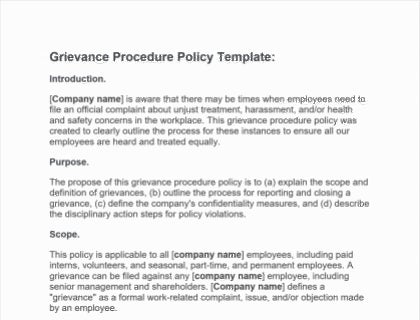
Grievance Procedure Policy - Free Template:
Download our customizable grievance procedure policy in Microsoft Word format.
Download NowGrievance Procedure Policy Template:
Introduction.
[Company name] is aware that there may be times when employees need to file an official complaint about unjust treatment, harassment, and/or health and safety concerns in the workplace. This grievance procedure policy was created to clearly outline the process for these instances to ensure that all of our employees are heard and treated equally.
Purpose.
The propose of this grievance procedure policy is to (a) explain the scope and definition of grievances, (b) outline the process for reporting and closing a grievance, (c) define the company's confidentiality measures, and (d) describe the disciplinary action steps for policy violations.
Scope.
This policy is applicable to all [company name] employees, including paid interns, volunteers, and seasonal, part-time, and permanent employees. A grievance can be filed against any [company name] employee, including senior management and shareholders. [Company name] defines a "grievance" as a formal work-related complaint, issue, and/or objection made by an employee.
Grievance Procedure:
Before filing an official grievance complaint, [company name] asks that all employees review the policy that directly impacts their complaint. For example, if an employee files a sexual harassment complaint, he/she must consult the company's Sexual Harassment Policy and the human resource (HR) department.
[Company name] encourages employees to resolve minor disputes with the help of a liaison officer, manager, and a human resource (HR) department representative. If the informal complaint is not fairly and constructively resolved within [number of days], employees may file a formal grievance.
Employees can file grievances when:
- They have been victims of workplace harassment.
- Their health and safety have been compromised.
- They've witnessed poor supervisor and/or management behavior.
- There are unjust changes made to the employment agreement.
- Policy guidelines are violated.
- There is a dispute between coworkers, suppliers, and/or management.
[Company name] also recognizes that every case is different and this list is subject to change, depending on the definition filed in the Grievance Complaint Form.
Filing a Grievance.
When filing a grievance, employees have the option of reporting their complaints using the company's official online portal or contacting their direct supervisor and the HR department. In both cases, employees will be required to complete and file a Grievance Complaint Form.
Once the complaint has been submitted to the HR department, employees have the right to attend meetings with a witness or union representative, appeal decisions, and depending on the severity of the complaint, refuse to attend work until the grievance is resolved.
When a grievance is filed against another employee, the accused also reserves the right to:
- View and request a copy of the official grievance complaint.
- Formally respond to the complaint after consulting his/her union representative and the HR department.
- Attend all formal meetings with a union representative or witness.
- Appeal the final decision.
Company Responsibilities.
It is [company name's] responsibility to:
- Accept and thoroughly investigate all Grievance Complaint Forms.
- Ensure that the grievance is resolved within [number of days] days, depending on the severity of each case.
- Treat all parties fairly throughout the grievance process.
- Adhere to the no-retaliation policy when employees file a complaint against management.
- Organize mediation meetings with the appropriate parties.
- Practice a high level of confidentiality throughout the grievance process.
- Accept and investigate all appeals.
- Ensure that the final decision is implemented.
- Maintain accurate and comprehensive records of each grievance.
Confidentiality.
[Company name] employees, including senior management and HR representatives, are required to sign a Confidentiality Agreement that limits them from discussing the grievance before and after it has been resolved. All parties are prohibited from discussing the matter with any other [company name] employee.
Policy Violations.
If an employee is found to have violated the grievance procedure policy, they will be subject to disciplinary action, up to and including termination. The severity of each case will determine the type of disciplinary action, which may include a verbal or written warning, suspension, and/or termination.
If an employee is unequivocally proven to have committed the grievance he/she is being accused of, [company name] will adhere to its Disciplinary Action Policy to ensure that the matter is resolved justly and according to company guidelines.

